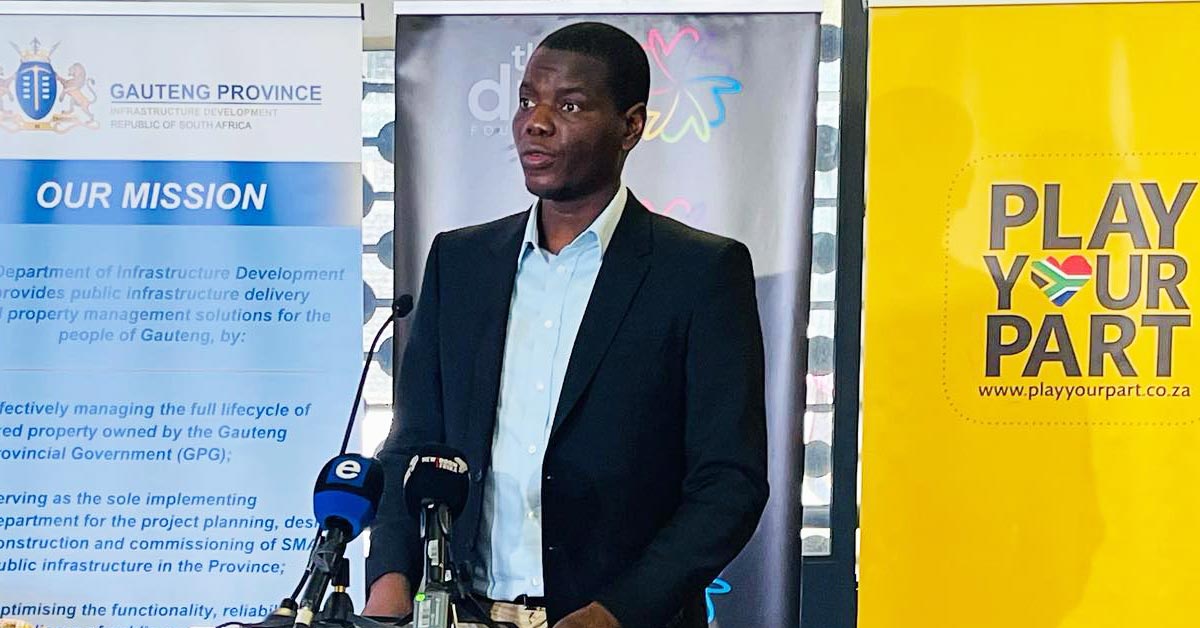Justice Minister Ronald Lamola admits LGBTIQ+ equality still not a reality

Justice and Correctional Services Minister Ronald Lamola spoke at the LGBTIQ+ Inclusion and Empowerment Workshop on Wednesday (Photo: Thami Dish Foundation)
South Africa’s Justice and Correctional Services Minister, Ronald Lamola, has acknowledged that many members of the LGBTIQ+ community have yet to see their constitutional equality made a lived reality.
Speaking at the LGBTIQ+ Inclusion and Empowerment Workshops at Constitution Hill on Wednesday, Lamola said that although the country has made strides to promote and protect the human rights of the LGBTIQ+ community, the attainment of these ideals remains elusive for many in that community.
“We live in a constitutional democracy which strives to ensure freedom, human dignity and equality for all – yet for LGBTIQ+ persons, these ideals are unattainable for so long as they face discrimination and violence in their daily lives,” the minister said, reported the SA Government News service.
Lamola noted that this year alone, there have been reports of at least 20 murders of members of the LGBTIQ+ community across the country.
“On numerous occasions in our communities, we see people choosing violence instead of embracing and celebrating diversity. I urge our communities to reflect on what prompts them to respond with such violence, intolerance and disdain to people who are of a different sexual orientation, gender identity, gender expression or sexual characteristics.
“We cannot claim to want human rights for ourselves, but deny it for others. Let us…recommit ourselves to the promotion and protection of human rights for all, especially for those in the LGBTIQ+ communities,” Lamola said.
Government intervention
The minister said the government has made a “number of interventions” to safeguard the rights of the LGBTIQ+ community. Lamola highlighted that one example is his department’s Rapid Response Team which “seeks to track and monitor hate crimes committed against LGBTIQ+ persons”.
Activists, however, have in the past claimed that the team has been dysfunctional at times and that not all government stakeholders – especially the police – have participated consistently.
Another measure highlighted by Lamola was the Hate Crimes Bill.
“The Prevention and Combating of Hate Crimes and Hate Speech Bill, which is currently before the National Assembly, has the capacity to, once enacted, not only ensure that justice is dispensed in matters of this nature, but also aims to prevent these attacks before they occur.”
Lamola added that his department together with the Department of Home Affairs, the European Union and civil society organisations will be holding a long-awaited dialogue to address amongst others, “Trans and Intersex policies for Legal Gender Recognition and ending Intersex Genital Mutilation in South Africa”.
“As our democracy matures, it has become evident that our policies are not in line with global practices when it comes to protecting the human rights of Transgender and Intersex persons.
“A pivotal outcome of the conference is to draft four policy briefs that focus on challenges faced by Transgender and Intersex persons in South Africa,” he said.
Hosted by the Thami Dish Foundation during South African Pride Month, the LGBTIQ+ Inclusion & Empowerment Workshops span four days and address the spheres of justice and law; media and communication; diversity and inclusion in the private and public sector; and mental health.
Below are the known victims of the LGBTIQ+ murders that have shaken South Africa since 12 February 2021:
- Bonang Gaelae, 29, whose throat was slashed in Sebokeng on 12 February.
- Nonhlanhla Kunene, 37, whose body was found half naked in Edendale, Pietermaritzburg on 5 March.
- Sphamandla Khoza, 34, who was beaten, stabbed and had his throat slit on 29 March in Kwamashu, Durban.
- Nathaniel ‘Spokgoane’ Mbele, who was stabbed in the chest in Tshirela, Vanderbijlpark on 2 April.
- Khulekani Gomazi, 27, who was beaten to death on 3 April in Mpophomeni in KwaZulu-Natal after being accused of sexual assault.
- Andile ‘Lulu’ Nthuthela, 41, whose mutilated and burned body was found on 10 April in KwaNobuhle, Kariega.
- Lonwabo Jack, a young LGBTIQ+ individual who had just celebrated his 22nd birthday on 17 April. His lifeless body was found on a pavement the next day in Nyanga, Cape Town.
- Lucky Kleinboy Motshabi, 30, whose body was found in a field in the town of Dennilton, Limpopo on 24 April. He was naked with stab wounds on his body.
- Phelokazi Mqathana, 24, who was stabbed to death on the weekend of 1 May in Khayelitsha, Cape Town. It was reported that a man stabbed her after she rejected his advances.
- Lindokuhle Mapu, 23, who was stabbed to death in Mfuleni, outside of Cape Town, on 9 May.
- Aubrey Boshoga, 48, whose body was dumped outside his house in Johannesburg on 29 May.
- Masixole Level, 28, whose body was found on a street in Kwazakhele, in the Eastern Cape, on 6 June.
- Anele Bhengu, 28, whose stabbed and mutilated body was discovered in KwaMakhutha, KZN, on 13 June.
- Lulama Mvandaba, who died days after being beaten outside a shebeen in Khayelitsha in the Western Cape in June.
- The body believed to be that of gay man Sam Mbatha was discovered in his burnt-out car in Klipgat in the North West province on 17 June.
- Motse Moeketsi, 36, whose body was discovered in Freedom Park in Gauteng after he was reported missing on 18 June.
- Sheila Lebelo, a 33-year-old lesbian-identifying woman, who was murdered in Atteridgeville, outside of Pretoria, in June.
- In August, 23-year-old Thapelo Sehata died in hospital following an assault in the town of Senwabarwana in Limpopo.
- Sisanda Gumede, a 28-year-old lesbian, was stabbed to death in a suspected homophobic hate crime in KwaZulu-Natal on 26 September, allegedly by her cousin.
- In Johannesburg, Zimasile Zubair Shabangu, 35, was stabbed to death in the early hours of 4 October at the Northriding home of the man alleged to have killed him.
Leave a Reply